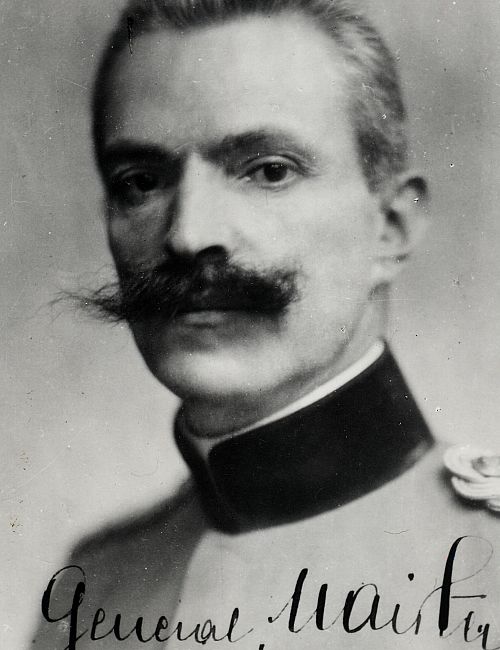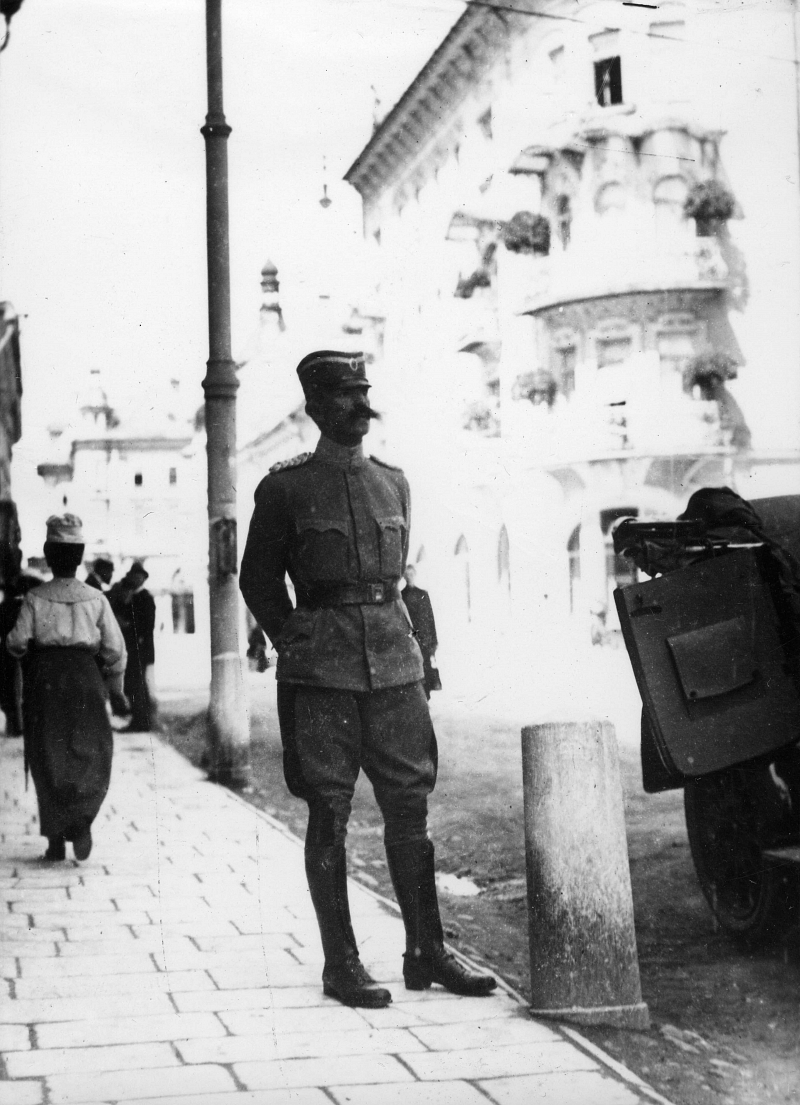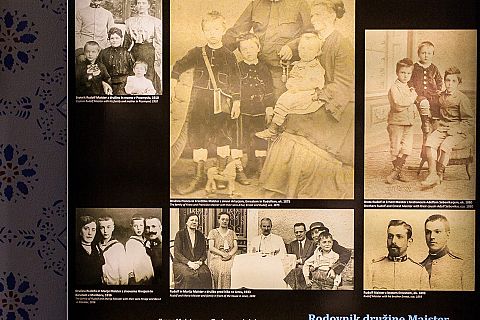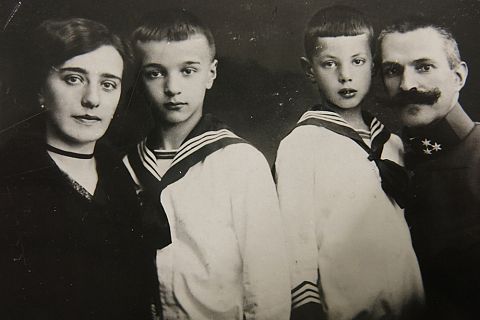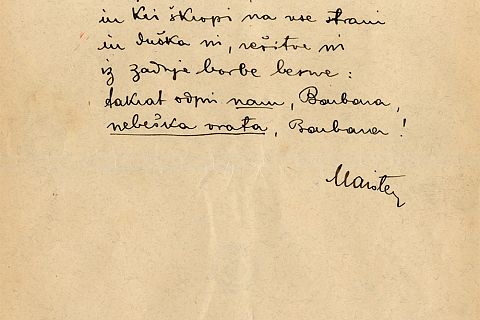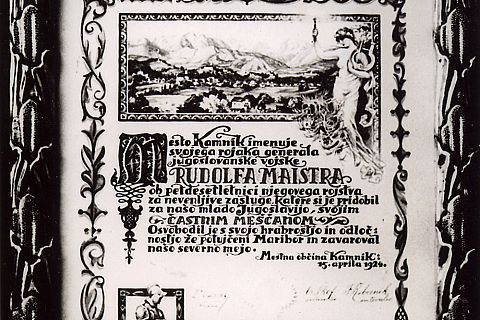- Info MM:K
Contact
Muzejska Pot 3, 1241 Kamnik, Slovenia
+386 (0)1 8317 662
info@muzejkamnik.siDŠ: 92474519
MŠ: 5095417000
TRR: SI56 0110 0600 0057 156Opening hours MM:K
Opening hours for visitors:
Tuesday-Saturday: 10.00 – 18.00,
Sunday, Monday and holidays: closed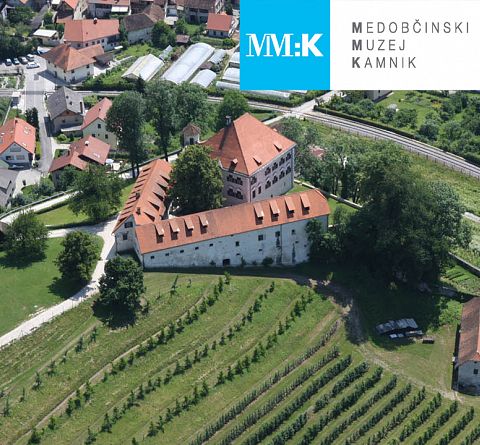
- Events & News
- Exhibitions
- Units
- Collections
- Education
- Shop
- About MM:K
Rudolf Maister's life
Rudolf Maister was born on 29 March 1874 at Šutna no. 16 in Kamnik, where his parents rented an apartment. The Maister family originates from Ptuj. In 1849 Rudolf’s father Franc Maister became employed as a supervisor in the financial guard and in 1867 married Frančiška Tomšič in Trebnje. The couple had three sons: Artur, Ernest and Rudolf. Due to the father’s work, the family frequently moved, first to Kamnik, then to Mengeš and in 1883 to Kranj, where the father died. Rudolf continued his education at grammar school in Ljubljana, but left in 1892 and enrolled at the military academy in Vienna, which he completed two years later. In 1905 he married Marija Stergar. They had two sons, Hrvoj and Borut. In 1923, Maister retired from the position of division general. He was living in Maribor, but also spending a lot of time in Zavrh in Slovenske gorice and Unec, where he died on 26 July 1934. He was buried with full military honours in the Pobrežje cemetery in Maribor.
Rudolf Maister’s military role was of crucial importance at the end of World War One, at the time of the formation of the newly founded State of Serbs, Croats and Slovenes, which later became the Kingdom of Serbs, Croats and Slovenes in 1918.
On 1 November 1918, Maister took command of Maribor and the whole of Lower Styria, placing them under the authorities of the National Council for Styria. The Council promoted him to the rank of general, which meant Maister now enjoyed a much higher reputation among the civilian population and unquestioned authority among the (loosely disciplined) military. At that time, Maribor town council decided to annex the town to the Republic of Austria and so Maister had very little support in the realisation of his goals. The National Government in Ljubljana also failed to support Maister’s mobilisation initiative, but nonetheless in November 1918 he founded the Slovene Army with 4000 soldiers and 200 officers. On 23 November 1918, he disarmed the German security guard unit in Maribor, dismantled it and took control over the town. He occupied the Slovene ethnic territory in Styria (Štajerska in Slovene) and after the conclusion of a peace treaty with Austria, the state border ran almost entirely along the same lines. In this way he prepared the foundations for an occupation of Carinthia, but the government in Ljubljana did not allow him to advance further. During the Slovene offensive on Carinthia in late April and early May 1919, Maister was given the task of preparing a defence line.
After victory and a ceasefire he took charge of the Carinthia border command, and so zone A of the plebiscite area was under his authority. On 18 September 1919, following a decision by the plebiscite committee, he had to withdraw from Carinthia with the police force he commanded at that time. On 10 October 1920, the fate of Carinthian Slovenes was finally decided in a plebiscite.
We must not forget Maister’s artistic creativity and cultural activities; he was a poet, painter and a passionate bibliophile. In 1904, his first collection of poems Poezije was published. He did not publish his second collection Kitica mojih until 1929.
Kamnik, his birthplace, has paid tribute to Maister on a number of occasions. On 15 April 1924, to mark his fiftieth birthday, he was made an honorary citizen, the document for which, in line with a suggestion by Josip N. Sadnikar, was made by Maksim Gaspari. On 4 September 1938, a memorial plaque (made by the famous Slovene architect Jože Plečnik) was unveiled on the house where Maister was born. On the 50th anniversary of the battles for the northern border, a proposal was made to erect a public monument to him. It was produced by the sculptor Anton Sigulin from Ljubljana and the festive unveiling took place on 25 October 1970 in the Trg Talcev square in Kamnik. And in 1996, the Municipality of Kamnik decided to turn the day on which Maister was born, 29 March, into a municipal holiday. In 2012, the Municipality of Kamnik was the main organiser of the renovation of the house in which Rudolf Maister was born.



